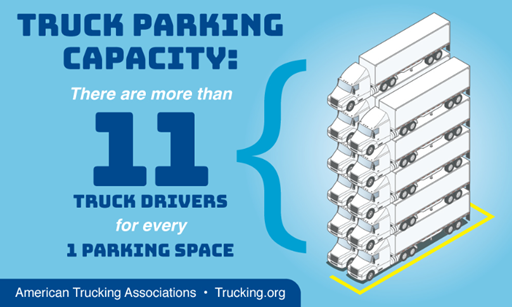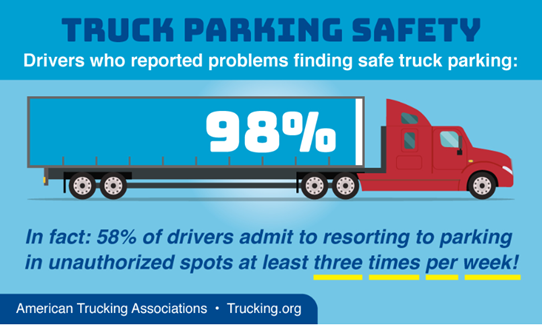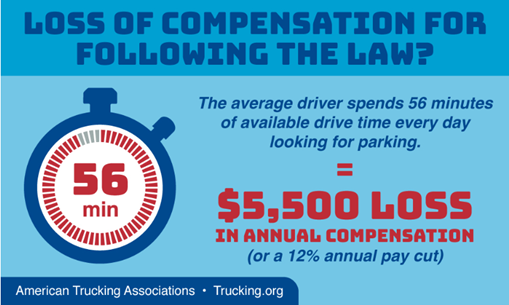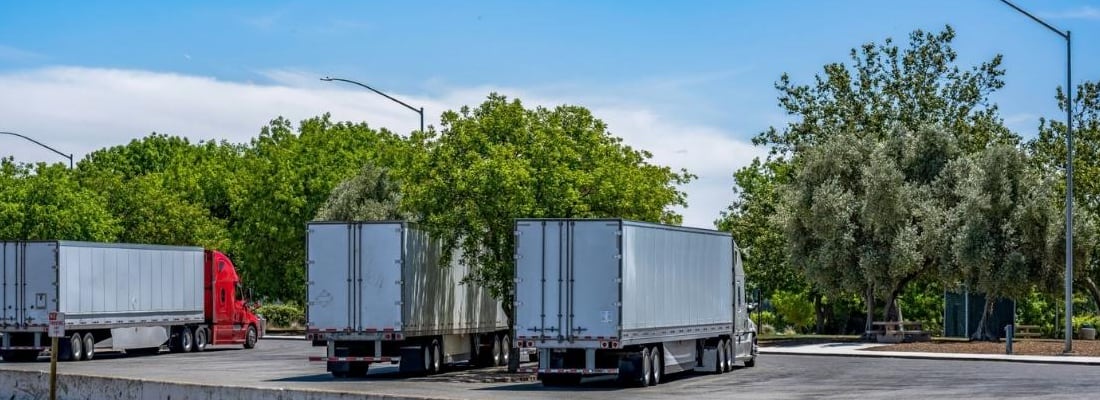Ask a trucker and they’ll agree: finding a safe, legal place to park is a serious problem. In fact, 98% of drivers reported problems finding truck parking, according to a recent American Trucking Association (ATA) survey.
The issue is clear. There’s simply not enough parking for truckers. The ATA calculates that there are 11 truck drivers for each truck parking spot. Infrastructure for the trucking industry hasn’t kept pace with the growing number of drivers on the road.

Drivers deal with safety issues, legal concerns, and lost compensation due to a lack of parking. The industry struggles with driver retention, and accessible truck parking greatly improves driver happiness. The U.S. House of Representatives recently advanced a $755 million truck parking bill. Passing this bill should help to build the parking infrastructure needed to support truckers and fleets.
Download: Driver Retention & Satisfaction Guide
Lack of parking creates difficult choices for truckers
Many truck drivers have faced a difficult choice because of a lack of parking. Often, the best available parking will be an unauthorized spot. 58% of drivers admit to parking in an unauthorized place three times per week.

This is a better option than parking in an unsafe place, which has resulted in tragedy. Jason’s Law was championed by Hope Rivenburg after she lost her husband. Jason was attacked while parked at an abandoned gas station. His destination—only 12 miles away—was closed and without a nearby place to park.
At the same time, drivers must either find their parking space within their work shift window, or risk violating hours of service regulations. Juggling these mission-critical issues creates stress for drivers, forcing them to make difficult decisions instead of focusing on the road.
Parking issues significantly impact the bottom line
The ATA reports that drivers spend an average of 56 minutes of driving time per day to find parking, which translates into a 12% pay cut and an average annual loss of $5,500 per driver. This shows how drivers deal with financial consequences due to a lack of parking.

Trucking companies lose revenue-earning miles when drivers must cut the run short to find a safe parking spot. Fleets also increase the risk of compliance violations when drivers struggle with parking. The industry already faces challenges with driver shortages and retention, so building truck parking infrastructure would be a positive step that contributes to a long-term solution.
Prioritizing truckers’ needs will improve retention
Typically, truckers enter the industry because they enjoy driving and earning a solid income. If working conditions prevent people from keeping the wheels turning, they will go to other industries that offer income opportunities without the frustration.
Driver retention has been a challenge for every fleet in North America for the last decade. The price of driver turnover is expensive. Recruiting, hiring, testing, screening, and training drivers costs trucking companies considerable time and money.
“Washington needs to listen to our nation’s truck drivers and respect their most serious needs,” said Chris Spear, ATA President and CEO. “They are the heartbeat of our economy.”
Prioritizing critical needs like truck parking will be a significant part of a push to improve driver retention. The issue of safe parking has been a top concern for more than a decade, and the House of Representatives hasn’t passed the Truck Parking Safety Improvement Act yet. For many drivers and fleets, new truck parking spots can’t arrive soon enough.
Fleets can make life easier for drivers right now
Fleets can equip truckers with driver-centric tools that make their life easier and let them focus on the road. The ISAAC solution offers automated, single-screen workflows and rugged, easy-to-use tablets that help drivers save time and frustration.


